Ten Steps to Financial Stability in the Economic Chaos of 2025
The year 2025 has begun for the global economy with signs of recovery, but under the shadow of unstable threats. Is sustainable growth on the horizon, or should we brace for new crises? In this article, we will explore the economic outlook while introducing practical books in this field.
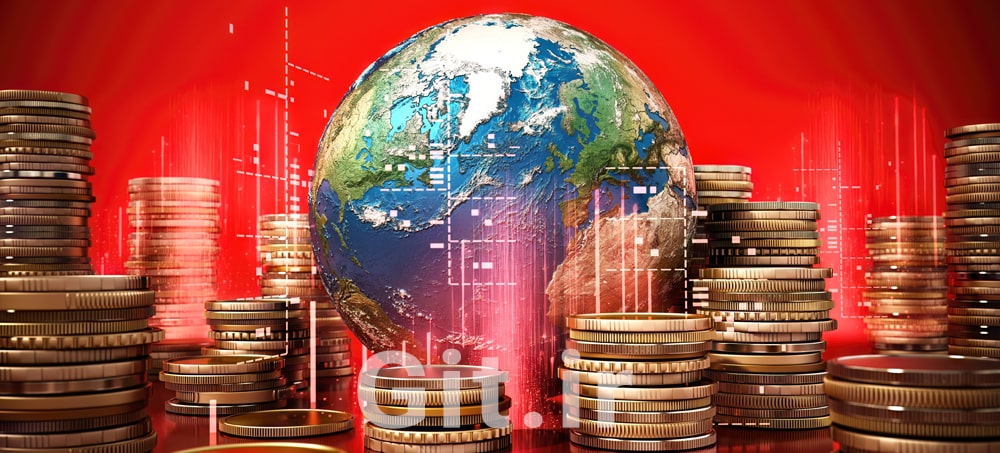
Global Economic Outlook for 2025
The year 2025 has started for the global economy with a mix of hope, caution, and uncertainty. After turbulent years due to the COVID-19 pandemic, regional conflicts, and supply chain challenges, the world economy is now entering a phase of reconstruction and redefinition of growth paths. Credible international reports, such as those from the Organization for Economic Cooperation and Development (OECD) and the International Monetary Fund (IMF), present a relatively optimistic picture, albeit with clear warnings for the future.
According to OECD forecasts, global GDP growth will reach approximately 3.3% in 2025. Meanwhile, inflation is expected to decline from 5.4% in 2024 to 3.8% in 2025. This reduction in inflation could indicate relative stability in the monetary and fiscal policies of developed countries, though concerns about labor markets, productivity, and economic inequality persist.
On the other hand, the IMF’s January 2025 report states that economic growth in many countries still depends on smart monetary policies, investment in digital infrastructure, and easing political tensions between nations. A major concern is the potential conflict between China and Taiwan, which could disrupt the supply chain of critical electronic components, such as chips (used in phones, computers, and cars), thereby threatening global economic stability.
In the United States, President Donald Trump’s economic policies, including imposing new tariffs on imports, have raised concerns about exacerbating an economic downturn. Experts warn that these policies may lead to reduced foreign investment, higher consumer goods prices, and, consequently, slower economic growth. Some analysts, including Ben Thompson, have emphasized that escalating trade tensions or geopolitical crises could push the global economy toward a “self-inflicted economic winter.”
Nevertheless, technological advancements, the development of renewable energy, and the shift toward a digital economy are among the factors that could drive global economic growth in the coming years. Countries that effectively capitalize on these opportunities will not only be more resilient to crises but also play a key role in shaping the future economic order.
In summary, 2025 can be seen as a year of new opportunities and old challenges. An economy oscillating between relative stability and structural risks requires smart policymaking, international cooperation, and preparedness for uncertainties.
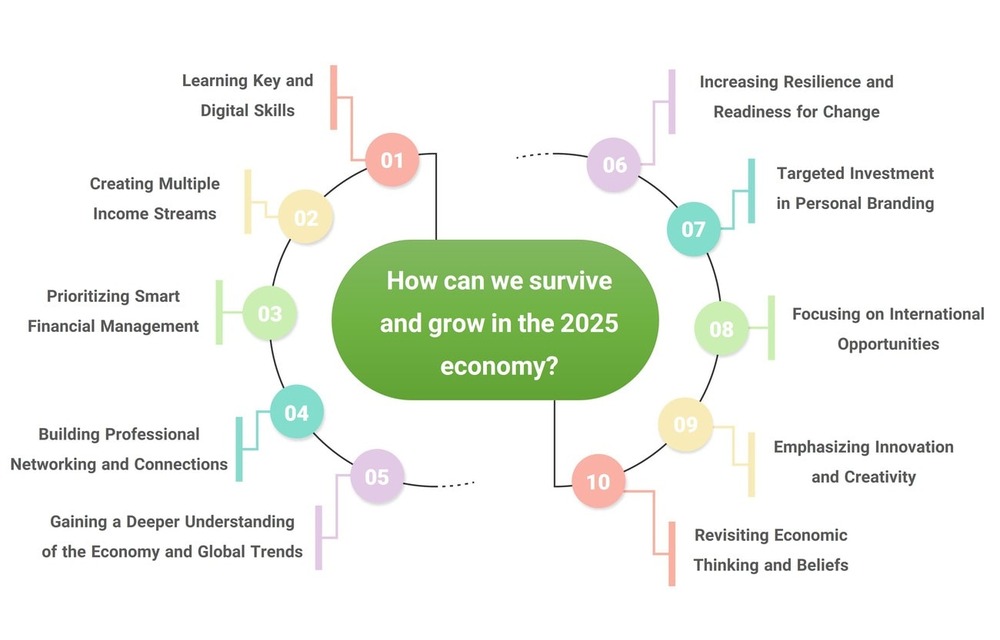
How can we survive and grow in the 2025 economy?
In a world grappling with high inflation, economic inequality, rapid technological changes, and evolving business models, merely waiting for stability is no longer the solution—progress through informed and intelligent action is the key. Below are the most critical pathways for growth and adaptation in the 2025 economy, along with the best recommended books for each area:
1. Learning Key and Digital Skills
In the rapidly digitizing global economic landscape of 2025, learning key and digital skills is essential. Technologies such as artificial intelligence, blockchain, and data analytics play a central role in the job market. Individuals who master these tools will not only enhance their competitiveness but also adapt to rapid economic changes. Investing in online education and specialized courses is an effective way to stay updated and meet the emerging needs of industries.
To learn key and digital skills, you can benefit from courses offered by git.ir. Below are some relevant categories to help you strengthen your desired skills:
🔷 List of Artificial Intelligence Courses
🔷 List of Blockchain Courses
🔷 List of Data Analytics Courses
🔷 List of Python Courses
🎧 Listen to the audio summary of Digital Minimalism by Cal Newport
This book focuses on the smart use of digital technologies and offers strategies to enhance digital skills without succumbing to distractions.
2. Creating Multiple Income Streams
Given the economic uncertainties of 2025, relying on a single income source can be highly risky. Creating diverse income streams—such as small businesses, financial market investments, or freelancing—helps mitigate financial risks. This approach not only strengthens financial security but also provides greater flexibility to seize new opportunities. Income diversification is the key to sustainable growth in a world full of unexpected changes. Below are some relevant categories to help you build these skills:
🔷 List of Freelancing and Gig Economy Courses
🔷 List of Business Courses
🔷 List of E-Commerce Courses
3. Prioritizing Smart Financial Management
Smart financial management in 2025 is critical due to currency fluctuations and global inflation. Precise budgeting, regular savings, and targeted investments make individuals resilient to potential crises. Using digital tools to track expenses and plan finances enables more informed decision-making. This approach builds a solid foundation for long-term economic stability and growth.
🔷 List of Economics and Investment Courses
🔷 List of Financial Markets Courses
🎧 Listen to the audio summary of I Will Teach You to Be Rich by Ramit Sethi
This book offers practical and modern strategies for money management, saving, and investing, accessible even for beginners.
4. Building Professional Networking and Connections
In the global economy of 2025, networking and professional connections play a pivotal role in accessing opportunities. Building relationships with relevant individuals and organizations provides valuable information and resources. Attending industry events, using platforms like LinkedIn, and collaborating with experts can open doors to new projects and partnerships. A strong network is a tool for growth and success in a competitive environment.
🎧 Listen to the audio summary of How to Win Friends and Influence People by Dale Carnegie
A classic book that teaches communication skills and how to build lasting relationships, essential for networking.
5. Gaining a Deeper Understanding of the Economy and Global Trends
A deep understanding of the global economy and its trends in 2025 enables individuals to make more informed decisions. Studying economic reports, following international news, and analyzing market data help identify opportunities and threats. This knowledge keeps individuals aware of the impacts of monetary policies, climate change, and technological advancements, laying the groundwork for strategic planning and sustainable growth.
In the rest of the article, we have introduced 20 outstanding books on economics that you can use to gain a deeper understanding of the global economy. Links to the audio summaries of these books are also provided for easy access.
6. Increasing Resilience and Readiness for Change
The economy of 2025 is marked by rapid and unpredictable changes, making resilience and courage in embracing change vital. Individuals who can adapt to new conditions and step out of their comfort zones have a higher chance of success. This trait enables quick responses to challenges and the ability to seize emerging opportunities, leading to growth in a dynamic environment.
🎧 Listen to the audio summary of Adaptability by Max McKeown
This book offers strategies for adapting to rapid changes and making bold decisions.
7. Targeted Investment in Personal Branding
In 2025, personal branding stands out as a significant competitive advantage. Investing in skill development, a professional online presence, and creating a unique identity builds trust with employers and clients. Using social media to showcase expertise and values can create new career and business opportunities. A strong personal brand keeps you distinguished and successful in a crowded global market.
🔷 List of Personal Branding Courses
🎧 Listen to the audio summary of Crushing It! by Gary Vaynerchuk
This book provides guidance on building a personal brand in the digital world, emphasizing the use of social media.
8. Focusing on International Opportunities
Globalization in 2025 has created countless opportunities in international markets. Pursuing these opportunities through partnerships with foreign companies, work migration, or service exports can lead to business expansion and increased revenue. Awareness of global market needs and alignment with international standards are key to tapping into this vast potential for economic growth.
🎧 Listen to the audio summary of The 4-Hour Workweek by Tim Ferriss
This book teaches ways to work remotely and capitalize on global opportunities, ideal for the borderless economy of 2025.
9. Emphasizing Innovation and Creativity
Innovation and creativity in the 2025 economy are the driving forces behind progress and differentiation. In a fiercely competitive world, offering novel solutions and creative ideas sets individuals and businesses apart from competitors. Encouraging out-of-the-box thinking and investing in research and development not only solves problems but also fosters sustainable growth and long-term success.
🎧 Listen to the audio summary of The Creative Curve by Allen Gannett
This book explains how to nurture creativity and innovation, offering strategies for success in a competitive economy.
10. Revisiting Economic Thinking and Beliefs
Revisiting economic thinking and beliefs in 2025 means abandoning outdated patterns and embracing new perspectives. This shift in mindset enables individuals to approach opportunities with an open mind and overcome mental limitations. Continuous learning, reading, and interacting with successful individuals can transform economic perspectives and foster a constructive approach to growth.
🎧 Listen to the audio summary of Thinking, Fast and Slow by Daniel Kahneman
This book analyzes mental processes in economic decision-making and helps reconstruct beliefs.
🔷 Read more: Daniel Kahneman: Author of Thinking, Fast and Slow
Books for a Better Understanding of the Global Economy
Below, we introduce a selection of books on the global economy that are useful for both beginners and those seeking deeper analysis.
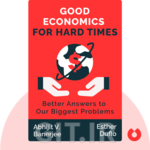
1. Good Economics for Hard Times - by Abhijit V. Banerjee and Esther Duflo
This book explores complex economic issues such as poverty, migration, and inequality, offering practical solutions based on field experiments. The authors, Nobel Prize winners in economics, use a data-driven approach to show how policymaking can improve real people’s lives. What sets the book apart is its human perspective and avoidance of dry theories, connecting economics to everyday life. It’s valuable for those seeking a deeper understanding of global challenges and real solutions.
Key Quote: “Good economics is economics that helps real people.”
🎧 Listen to the audio summary of Good Economics for Hard Times
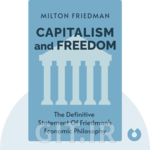
2. Capitalism and Freedom - by Milton Friedman
In this book, Milton Friedman defends economic freedom as the foundation of political freedom and advocates for limited government intervention. With clear arguments and tangible examples, he presents free-market capitalism as the best system for growth and prosperity. The book’s hallmark is its blend of philosophy and economics to critique government overreach. It’s highly useful for those interested in liberal economics, individual liberty, or classical capitalist perspectives.
Key Quote: “Economic freedom is a necessary condition for political freedom.”
🎧 Listen to the audio summary of Capitalism and Freedom
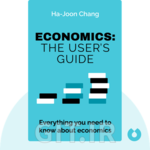
3. Economics: The User’s Guide - by Ha-Joon Chang
Ha-Joon Chang explains economics in a simple and humorous way, exploring it from various perspectives. He reviews economic history and schools of thought, showing how economic decisions impact our lives. The book’s unique feature is its invitation to critical thinking and challenging common beliefs. It’s ideal for beginners or those who want to understand economics without technical complexities and reflect on its role in society.
Key Quote: “Economics is about our choices, not just money.”
🎧 Listen to the audio summary of Economics: The User’s Guide
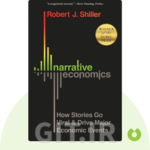
4. Narrative Economics - by Robert J. Shiller
Robert Shiller examines how stories and narratives influence economic behavior and even shape crises. Using historical examples, he shows how social narratives can drive markets. The book’s standout feature is its blend of economics with psychology and cultural analysis. It’s highly engaging and useful for those interested in behavioral economics, financial history, or the impact of culture on economic decision-making.
Key Quote: “Stories can drive or stall economies.”
🎧 Listen to the audio summary of Narrative Economics
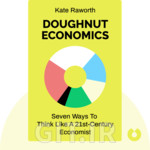
5. Doughnut Economics - by Kate Raworth
Kate Raworth proposes a new economic model that balances human needs with planetary limits. She critiques traditional economics and offers a sustainable, creative perspective. The book’s unique feature is its innovative approach and emphasis on social and environmental justice. It’s highly inspiring and practical for those interested in sustainability, climate change, or rethinking economic systems for a better future.
Key Quote: “The 21st-century economy must serve both people and the planet.”
🎧 Listen to the audio summary of Doughnut Economics
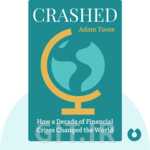
6. Crashed - by Adam Tooze
Adam Tooze analyzes the 2008 financial crisis in detail from multiple angles, showing how it transformed the global economy and politics. With a historical and multifaceted perspective, he examines its long-term impacts. The book’s distinguishing feature is its comprehensive and precise narrative. It’s highly beneficial for those interested in economic history, global politics, or understanding the roots of modern financial transformations.
Key Quote: “Crises not only reshape economies but also rewrite history.”
🎧 Listen to the audio summary of Crashed
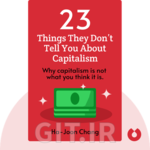
7. 23 Things They Don’t Tell You About Capitalism - by Ha-Joon Chang
Ha-Joon Chang, in a straightforward and simple tone, debunks common myths about capitalism, showing that the system doesn’t always work as advertised. With real-world examples, he sharply critiques free-market ideologies. The book’s unique feature is its accessible and critical approach. It’s ideal for those interested in critiquing capitalism, social justice, or understanding the realities behind economic systems.
Key Quote: “Capitalism has many stories, but not all of them are true.”
🎧 Listen to the audio summary of 23 Things They Don’t Tell You About Capitalism
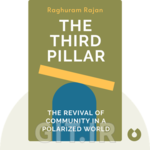
8. The Third Pillar - by Raghuram Rajan
Raghuram Rajan argues that economic success requires a balance between government, markets, and society. He highlights the role of local communities against globalization and critiques their weakening. The book’s standout feature is its deep analysis and practical solutions. It’s highly useful and inspiring for those interested in social economics, policymaking, or strengthening communities in the modern world.
Key Quote: “Without strong communities, markets and governments collapse.”
🎧 Listen to the audio summary of The Third Pillar
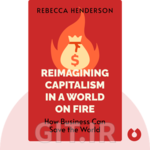
9. Reimagining Capitalism in a World on Fire - by Rebecca Henderson
Rebecca Henderson shows how capitalism can align with social and environmental responsibility, with businesses playing a key role in solving global problems. She offers practical ways to rebuild the system. The book’s unique feature is its optimistic and pragmatic approach. It’s highly practical for entrepreneurs, managers, or those interested in reforming capitalism for a sustainable future.
Key Quote: “Capitalism can save the world if reimagined.”
🎧 Listen to the audio summary of Reimagining Capitalism in a World on Fire
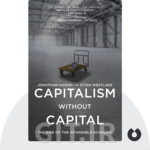
10. Capitalism Without Capital - by Jonathan Haskel
Jonathan Haskel explores the rise of an economy driven by intangible assets like software, brands, and innovation, showing how they’ve transformed modern economics. With data analysis, he explains structural changes. The book’s distinguishing feature is its focus on the digital economy and innovation. It’s highly engaging for those interested in technology, contemporary economics, or the future of capitalism in the digital age.
Key Quote: “Capital today is no longer just factories and machines.”
🎧 Listen to the audio summary of Capitalism Without Capital
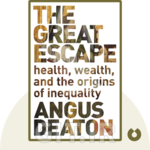
11. The Great Escape - by Angus Deaton
Angus Deaton examines humanity’s progress in health and wealth, showing how some societies have escaped poverty and disease. He also highlights existing inequalities with historical and economic data analysis. The book’s unique feature is its blend of economics with human stories, making it highly readable. It’s useful for those interested in development history, inequality, or improving quality of life, offering a deep perspective on progress and challenges.
Key Quote: “Human progress is great, but not everyone shares in it.”
🎧 Listen to the audio summary of The Great Escape
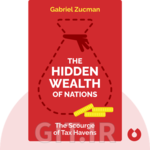
12. The Hidden Wealth of Nations - by Gabriel Zucman
Gabriel Zucman addresses tax evasion and hidden wealth in tax havens, showing how this phenomenon exacerbates inequality. With precise data, he clarifies the scale of the issue. The book’s standout feature is its transparent and statistical analysis of a complex topic. It’s highly useful for those interested in global economics, tax justice, or policymaking, offering a clearer understanding of modern inequality.
Key Quote: “Hidden wealth conceals visible inequality.”
🎧 Listen to the audio summary of The Hidden Wealth of Nations
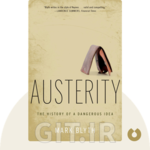
13. Austerity - by Mark Blyth
Mark Blyth examines the history and impacts of austerity policies, arguing that they often produce counterproductive results. With a critical perspective and historical examples, he highlights their destructive effects. The book’s unique feature is its engaging narrative and sharp critique of mainstream ideas. It’s useful for those interested in political economy, policymaking, or the history of financial crises, offering a different perspective on economic decisions.
Key Quote: “Austerity is a cure that kills the patient.”
🎧 Listen to the audio summary of Austerity
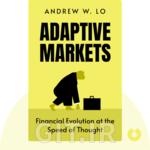
14. Adaptive Markets - by Andrew W. Lo
Andrew Lo presents a new theory of financial markets that accounts for human behavior and evolution. He shows how markets adapt to changing conditions, moving away from traditional models. The book’s distinguishing feature is its integration of biology and economics to explain markets. It’s highly useful for those interested in behavioral economics, finance, or market analysis innovation, offering a fresh perspective on market dynamics.
Key Quote: “Markets evolve like living organisms.”
🎧 Listen to the audio summary of Adaptive Markets
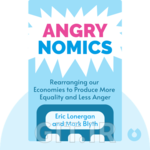
15. Angrynomics - by Eric Lonergan and Mark Blyth
This book explores public anger toward the economic system and its roots, proposing solutions to reduce inequality and tension. The authors connect economics to people’s emotions in simple language. The book’s unique feature is its empathetic and pragmatic approach to today’s issues. It’s useful for those interested in social economics, public protests, or economic reforms, offering solutions for a fairer world.
Key Quote: “People’s anger is a warning bell for the economy.”
🎧 Listen to the audio summary of Angrynomics

16. Super Crunchers - by Ian Ayres
Ian Ayres shows how big data and statistical analysis have transformed decision-making in fields from business to politics. With real-world examples, he demonstrates the predictive power of data. The book’s standout feature is its simple and practical explanation of modern technologies. It’s highly useful for those interested in data science, digital economics, or using statistics in daily life, illuminating the future of decision-making.
Key Quote: “Data predicts the future, not just shows the past.”
🎧 Listen to the audio summary of Super Crunchers
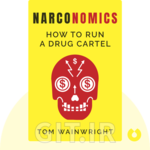
17. Narconomics - by Tom Wainwright
Tom Wainwright examines the economics behind drug cartels, showing how they operate like major corporations. With firsthand reporting, he sheds light on this hidden world. The book’s unique feature is its economic perspective on organized crime. It’s useful for those interested in criminal economics, investigative journalism, or analyzing illegal businesses, offering a unique viewpoint.
Key Quote: “Cartels think about profits just like companies do.”
🎧 Listen to the audio summary of Narconomics
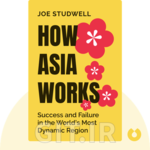
18. How Asia Works - by Joe Studwell
Joe Studwell analyzes the economic success of Asian countries like Japan and South Korea, attributing their development to policies in land, industry, and education. He explains Asia’s growth model in detail. The book’s distinguishing feature is its historical and comparative analysis. It’s useful for those interested in economic development, Asian history, or policymaking, offering lessons for other nations.
Key Quote: “Asia’s success was not accidental; it was planned.”
🎧 Listen to the audio summary of How Asia Works
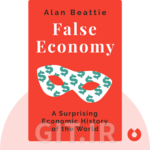
19. False Economy - by Alan Beattie
Alan Beattie, with a historical and humorous lens, examines countries’ economic decisions, showing how poor choices lead to failure. Through storytelling, he draws lessons from the past. The book’s unique feature is its entertaining yet profound narrative. It’s useful for those interested in economic history, global politics, or analyzing human errors, offering an engaging perspective on economics.
Key Quote: “History shows that economics can be foolish too.”
🎧 Listen to the audio summary of False Economy
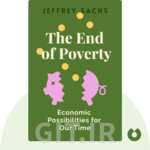
20. The End of Poverty - by Jeffrey Sachs
Jeffrey Sachs, with optimism, presents a plan to end global poverty, emphasizing the role of international aid and sustainable development. With data and examples, he offers practical solutions. The book’s standout feature is its hopeful and pragmatic approach. It’s useful for those interested in global development, poverty reduction, or humanitarian policies, inspiring efforts for a better world.
Key Quote: “Poverty can end if we have the will.”
🎧 Listen to the audio summary of The End of Poverty
Please Log in to leave a comment.